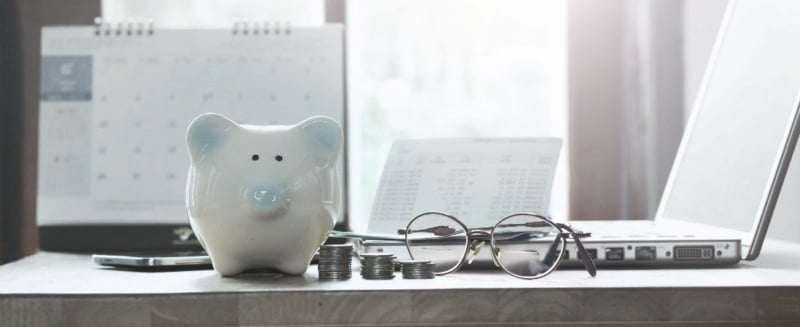Planning for the worst while hoping for the best is essential for successful retirement planning. In addition to your retirement savings, it’s important to create an emergency fund that you can tap if you face a financial emergency now or in retirement.
Retirement tips: How to build an emergency fund
Nobody plans on a financial emergency, but it’s important to be prepared for one. One of your best defenses against a budget-shattering financial crisis is your emergency fund.
Your emergency fund should be in an account separate from your checking. It should be liquid, readily accessible, and, most importantly, only used for a financial emergency.
Whether you’re retired or currently in the workforce, there are ways you can find extra cash to contribute to your emergency fund. Save money with these 21 tips and then toss the money you’ve saved directly into your emergency fund:
1. Save spare change. When you get home at the end of the day, put your spare change in a jar. After a year, take the jar to the bank and deposit the cash into your emergency fund.
2. Sell unworn clothes, jewelry, and other items. Sell any jewelry or clothing that you seldom wear, as well as any household or other items you no longer use. Have a yard sale or sell it on Craigslist or eBay.
3. Save your tax refunds. If you get a tax refund, look at it as forced savings and not as a cash bonus at the end of the year. Save it, don’t spend it. You can even increase the tax withholding on your W-4 in order to get a bigger tax refund for even more forced savings.
4. Set up automatic transfers. If you don’t see it, you won’t spend it. Have some money automatically debited from your personal checking account into your emergency fund.
5. Divvy up your paycheck. If your employer automatically deposits your paycheck into your checking account, see if you can divide the money. Have part of the check deposited into your checking account and part of it deposited into savings.
6. Don’t waste cash. Convert a mindless daily habit to a weekly or monthly treat. For example, instead of indulging in a gourmet latte every day, do so only once in a while or just on payday.
7. Bargain shop for designer brands. You can find name-brand clothing at resale shops, consignment stores, and discount retailers. Bargain shop for everything—clothes, food, and household items—and always look for sales.
8. Keep an eye on the thermostat. Turn the thermostat up in the summer and down in the winter, or install a programmable thermostat. Doing so can save you money on your utility bills each month.
9. Get rid of your home phone. While some people like to keep their home phones just in case of an emergency, you may want to consider ditching yours altogether if you have a cell phone.
10. Skip the drinks. Instead of pricey alcoholic or soda beverages, only drink water when you go out to lunch or dinner.
11. Get a second job. It’s not ideal, but if you really need to catch up on savings you may want to consider a second job. Try a seasonal position at a retail store. These types of jobs only last through the holidays, and you may be eligible for employee discounts. (Just don’t spend all your extra money at the store.)
12. Choose generic over brand name. In many cases, the ingredients and quality are the same, and the savings can be substantial.
13. Save those small bills. At the end of the day, take your dollar bills out of your wallet or purse and put them in an envelope to be deposited into your savings account.
14. Cut the cable. Eliminate cable, or at least reduce the number of channels to which you subscribe. You may be surprised by how many shows you can still watch using online resources.
15. Don’t forget the library. Cut your entertainment expenses even further by checking out free movies (and books) from the library.
16. Quit your bad habits. Cigarettes and alcohol are expensive, and they often have added taxes. Cut back where you can to save money, or quit altogether to save even more.
17. Downgrade your technology. If you don’t need it for work, consider trading your smartphone for a cell phone with fewer features. Or, try a no contract plan or pay-as-you-go option.
18. Search for savings. Before you head to the grocery store, take some time to clip a few coupons.
19. Cut back on dining out. Pack your lunch instead of eating out every day, and limit dinners out to a few times each month.
20. Save on gas. Use a site like GasBuddy.com to find the cheapest gas, and consider carpooling with your coworkers instead of driving every day. Take public transit if it’s available, or try walking or biking to work if you live close by.
21. Pay off your debt. Use the money you would be spending on credit card and other debt payments to fund your emergency savings.
If you are living paycheck to paycheck, I know that it may be extremely difficult to build an emergency fund. While you may not be able to do everything listed here, you should be able to do at least a few things that can help you add to your emergency fund.
Even if you can only add a little bit of money each month, something is better than nothing. Over time, your emergency fund will grow—as long as you keep adding to it.
What tips do you have for building an emergency fund?
Steve Repak is a CERTIFIED FINANCIAL PLANNER™ professional, CFP® Board Ambassador, and financial literacy speaker. He is also an Army veteran and the author of Dollars & Uncommon Sense: Basic Training For Your Money. Follow him on Twitter: @SteveRepak






